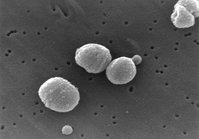Bacterial pneumonia
Bacterial pneumonia is an infection of the lungs by bacteria. more...
See pneumonia for a general overview of pneumonia and its other causes.
Causes
Streptococcus pneumoniae (J13) is the most common bacterial cause of pneumonia in all age groups except newborn infants. Streptococcus pneumoniae is a Gram-positive bacteria which often lives in the throat of people who do not have pneumonia. Another important Gram-positive cause of pneumonia is Staphylococcus aureus (J152).
Gram-negative bacteria are seen less frequently; Haemophilus influenzae (J14), Klebsiella pneumoniae (J150), Escherichia coli (J155), Pseudomonas aeruginosa (J151) and Moraxella catarrhalis are the most common. These bacteria often live in the gut and enter the lungs when contents of the gut (such as vomit) are inhaled.
The "atypical" bacteria are Chlamydophila pneumoniae (J160), Mycoplasma pneumoniae (J157), and Legionella pneumophila. They are "atypical" because they commonly affect teenagers and young adults, are less severe, and require different antibiotics than typical bacteria such as Streptococcus pneumoniae.
Pathophysiology
Bacteria typically enter the lung with inhalation, though they can reach the lung through the bloodstream if other parts of the body are infected. Often, bacteria live in parts of the upper respiratory tract and are continually being inhaled into the alveoli. Once inside the alveoli, bacteria travel into the spaces between the cells and also between adjacent alveoli through connecting pores. This invasion triggers the immune system to respond by sending white blood cells responsible for attacking microorganisms (neutrophils) to the lungs. The neutrophils engulf and kill the offending organisms but also release cytokines which result in a general activation of the immune system. This results in the fever, chills, and fatigue common in bacterial and fungal pneumonia. The neutrophils, bacteria, and fluid leaked from surrounding blood vessels fill the alveoli and result in impaired oxygen transportation.
Bacteria often travel from the lung into the blood stream and can result in serious illness such as septic shock, in which there is low blood pressure leading to damage in multiple parts of the body including the brain, kidney, and heart. They can also travel to the area between the lungs and the chest wall, called the pleural cavity.
Treatment
Antibiotics are the treatment of choice for bacterial pneumonia. The antibiotic choice depends on the nature of the pneumonia, the microorganisms most commonly causing pneumonia in the geographical region, and the immune status and underlying health of the individual. In the United Kingdom, amoxicillin is used as first-line therapy in the vast majority of patients who acquire pneumonia in the community, sometimes with added clarithromycin. In North America, where the "atypical" forms of community-acquired pneumonia are becoming more common, clarithromycin, azithromycin, or fluoroquinolones as single therapy, have displaced the amoxicillin as first-line therapy. In hospitalized individuals or those with immune deficiencies, local guidelines determine the selection of antibiotics. These antibiotics are typically given through an intravenous line.
Read more at Wikipedia.org



